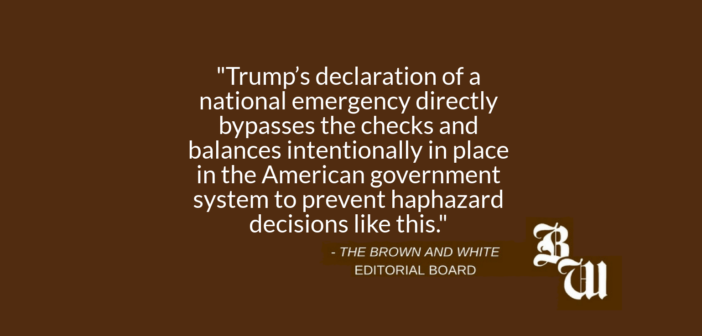President Donald Trump declared a national emergency on the U.S.- Mexico border on Feb. 15. The declaration is believed to be a retaliation against Congress for failing to meet his request for upwards of $5.7 billion, in addition to the $1.38 billion he has already been granted, to build the border wall.
The declaration of national emergencies is a routine decision that has been made by all presidents at some point throughout their respective tenures, but the reason behind Trump’s decision drastically contrasts those that preceded him.
Past declarations have included a response to the Iran hostage crisis in 1979 during the Carter administration, the time period following the attacks on the World Trade Center in September 2011 during the Bush administration and a response to Chinese cyber attacks in 2015 during the Obama administration.
Trump claims that the immediate reasoning behind his declaration is to protect Americans from an “invasion of our country with drugs, with human traffickers, with all types of criminals and gangs.”
He followed up his statements by explaining that he doesn’t need to call a national emergency, but he is merely doing so to expedite the process of starting wall construction, despite many other unverified claims that he has made prior that the wall is already in the works.
Trump’s declaration of a national emergency directly bypasses the checks and balances intentionally in place in the American government system to prevent haphazard decisions like this. This “congressional loophole” contradicts the inherent reasons for Congress’ existence in the first place.
The purpose of declaring a national emergency is to allow the president to act swiftly in times of great urgency and need, not to gain the upper hand in a back-and-forth game with Congress.
If Trump is successful in obtaining upwards of $5.7 billion for the wall, he will be taking funds from other “pots of money,” as he calls them, including those used for military construction.
“A possible source for fattening border wall funding would be the billions of dollars appropriated this year for military construction. A 1982 law empowers the secretary of defense to redirect military construction funds during a presidentially declared national emergency,” an NPR report said.
After a failed government shutdown, the declaration of a national emergency represents a series of continuous losses for Trump. This last-ditch effort to obtain funds represents a harsh, long-approaching reality — a lack of unity and respect from Congress.
Over the course of the longest government shutdown in history, almost 800,000 federal workers went more than a month without pay, unable to provide for themselves and their families.
Economists estimate that the shutdown cost the U.S. government $20 billion. The money lost during the shutdown easily could have gone toward wall construction, but instead only indebted Trump and the American economy, making congress less likely to fund the project.
Trump proclaims that the building of a border wall will provide millions of American jobs, but in doing so, many dual citizens who commute across the border for work are at an extremely high risk of becoming unemployed. In addition, building the wall will destroy remaining trade relations with Mexico, steepen an already greatly flawed immigration system and greatly impact Mexican cities whose economies rely heavily on tourism from the U.S.
As a first term president, Trump’s first goal is re-election. In kick-starting the building of his wall, despite great backlash from congress and the American people, his success will drastically make or break his chances of being sworn in for a second term.
Pennsylvania, which is one of the few remaining swing states, potentially has a lot at stake by the creation of this wall. As one of the leading producers of domestic steel and iron, going forward with the building of a wall may mean great things for job creation and could result in Trump removing the 25 percent tariff implemented on steel last year.
If Trump includes Pennsylvania as a prime partner in wall construction, he could drastically increase chances of securing votes among many middle class workers who may be unsure where they fall on the dispute.






Comment policy
Comments posted to The Brown and White website are reviewed by a moderator before being approved. Incendiary speech or harassing language, including comments targeted at individuals, may be deemed unacceptable and not published. Spam and other soliciting will also be declined.
The Brown and White also reserves the right to not publish entirely anonymous comments.